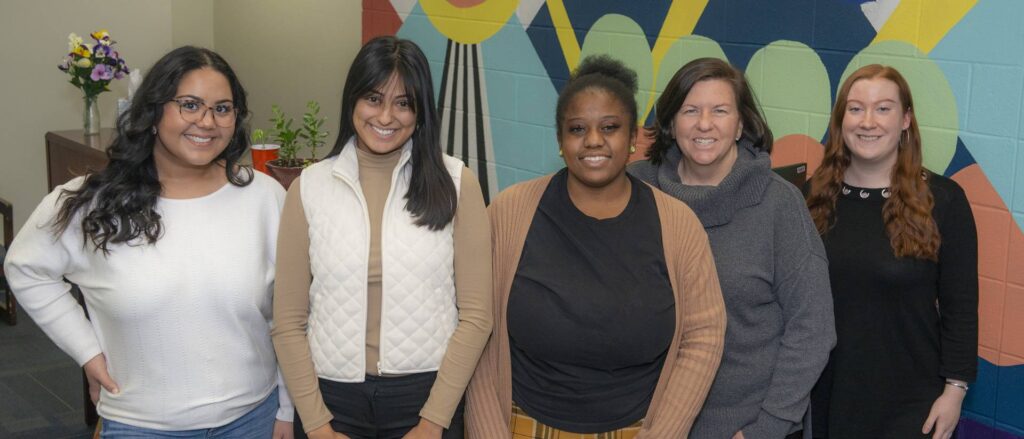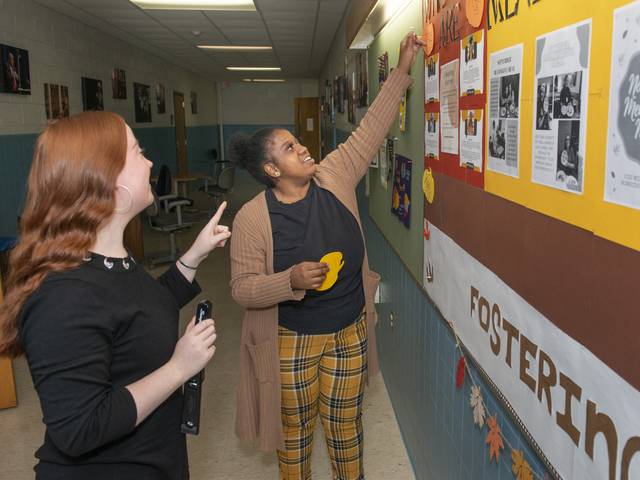
In fall 2022, a team of UW-Eau Claire undergraduate and graduate students helped the university’s Fostering Success program reach more current and future Blugolds who were in foster care or experienced homelessness as youth enroll and be successful in college. This Fostering Success leadership team includes, from left, students Molly Urmanski, Mia Johnson and Taz Smith, along with staff member Jodi Thesing-Ritter and graduate student Jessica Brooks. (Photo by Shane Opatz)
The University of Wisconsin-Eau Claire’s Fostering Success program is making huge leaps forward thanks to a $70,000 grant it received from the UW System this summer, program leaders say.
UW-Eau Claire’s Fostering Success program — launched in 2019 by members of a campus leadership program — offers financial and other support to students who have formerly been in foster care or are experiencing homelessness.
With the help of the grant monies, the program is making connections with students in area high schools, making more current Blugolds who qualify for the program aware of what it can offer, and growing the programs and support it offers to students who already are part of the program, says Jodi Thesing-Ritter, executive director for diversity and inclusion, who oversees the program.
This fall, Fostering Success moved into its own office, sharing space with the university’s Campus Closet and Campus Harvest programs, giving students in the program easy access to clothing and food resources. The new space also gives the program a home base, which is helping to build stronger connections among staff and students, Thesing-Ritter says.
“We are working hard on a number of initiatives as we build a program that will help even more students enroll in and be successful in college,” Thesing-Ritter says. “So many good things already have happened with Fostering Success, and much more is being planned.”
Students leading the way

Jessica Brooks and Taz Smith are among the Blugolds helping promote the Fostering Success program. (Photo by Shane Opatz)
Hiring students — all with ties to foster care during their youth — to help lead Fostering Success is among the best of the “good things” the new grant made possible this fall, Thesing-Ritter says.
The three interns and a graduate student all bring a “lived perspective to the program that is so important,” Thesing-Ritter says. “Having them here to help build a strong foundation for this program is a real gift,” she says.
The internship team includes Mia Johnson, a senior psychology major from Illinois; Taz Smith, a criminal justice major from Green Bay who will graduate this month; and Molly Urmanski, a senior from Edgar who is pursuing a major in communication and a critical Hmong studies certificate.
Jessica Brooks, a graduate student in an online social work master’s program, supports the Fostering Success office as a graduate assistant.
Urmanski was born in Russia, abandoned by her birth mother and adopted by a family in Wisconsin; Johnson experienced guardianship, foster care and, as a teen, became an orphan; Smith — who as a freshman was a co-founder of Fostering Success, spent time in foster care as a youth; and Brooks was briefly in foster care before she was adopted as an infant.
“They understand the struggles students with backgrounds similar to their own face as they try to adjust to and be successful in college,” Thesing-Ritter says. “They know there are things they struggle with that most students don’t even think about. So, they’re excited to help us find new ways to provide the kinds of support and resources that will be the most helpful.”
Building pathways to college
A critical part of Fostering Success’ planning is convincing high school students who are in foster care or who are homeless to pursue higher education, Thesing-Ritter says. The student leadership team is already working with Eau Claire area schools to build those connections, she says.
This fall, Urmanski worked with peers in a communication class to create an outreach program that took her into area high schools to share information about Fostering Success.
“I was able to spread the word about Fostering Success,” Urmanski says. “We went to high schools in Eau Claire and talked to students about postsecondary education and how resources like Fostering Success are available to them. It’s a good start to building those connections with schools.”
Given their life stories, the interns are great role models and sources of information, Thesing-Ritter says.
“It really helps to have mentors like Mia, Molly and Taz talking with high school students because they can show them that college is possible, and that we will support them if they come to UW-Eau Claire,” Thesing-Ritter says.
Johnson says when she was in high school, she was interested in college but didn’t think it was within her reach. So, it’s rewarding to now share her story with others in similar situations.
“I was placed in foster care when I was 9 and aged out at 18,” Johnson says. “My mom passed away when I was in high school. So, going into college, I had no family support; I didn’t even know how to apply.”
When a UW-Eau Claire admissions counselor who was visiting her high school told her about Fostering Success, it “changed the whole game,” Johnson says. For the first time, she believed college might be possible for her.
“There are many kids in foster care who don’t have people to show them what’s possible,” Johnson says. “I want them to see that while they’ll have to work hard, college is possible for them. It’s really cool to know that I can have such a personal impact. Just knowing that we can offer that kind of support and inspiration is super huge.”
Blugolds supporting Blugolds
Johnson also knows that while enrolling in college is challenging for young people coming out of the foster care system, adjusting to and being successful in college also is difficult.
“As soon as I stepped on campus, I was in love with it,” Johnson says of UW-Eau Claire. “It felt like home to me right away and it still does. I love this place, the area and the people.”
Still, Johnson says, her first semester was a “bumpy journey” because it was hard to move out of foster care right into a college dorm. The social expectations and other pressures of college were stressful because they were so different than anything she had experienced growing up.
“When you’re in foster care, you live in survival mode,” Johnson says. “When you get to college, you’re still working to get out of it. It’s hard to reach out to people when you’ve never had anyone there for you. It was a difficult transition, and one I had to manage on my own.”
Feeling overwhelmed, she moved back to Illinois for a semester, taking classes online as she focused on her mental health. When Johnson returned to campus for her sophomore year, she felt more confident and comfortable navigating the college landscape.
Now, as an intern, she’s drawing on her personal experiences as she considers how to help young people from similar backgrounds manage the transition. She knows many of the things that were hard for her are things that students from more traditional backgrounds don’t even think about.
For example, she remembers how it felt when her first college roommate regularly received care packages, encouragement and other kinds of support from her parents.
“I was happy for her, but I didn’t have anyone who would do that for me, and that was hard,” Johnson says. “So, it was really fun this semester to deliver midterm baskets to students in our program. It’s a way to let them know we care and hope they’re doing well in school. We included personal cards to let them know we’re thinking about them. It meant a lot to us to do that for them.”
The interns host monthly “meaningful meals” dinners, inviting students to prepare something that’s important to them and then sharing their stories as they enjoy the meal. It’s a way to bring students together, build connections and help them know they aren’t alone, Johnson says.
Making those personal connections with other students is the “biggest thing” she and the other interns have accomplished this semester, Johnson says.
“We’re reaching out to students individually to see what they need,” Johnson says. “We’re asking them how they’re doing in their classes and how we can help because we know they don’t have families asking them those things. Those personal connections matter to them and to us.”
It was those kinds of outreach efforts that brought Urmanski into the program. She was invited to a Fostering Success open house, and immediately felt a connection to the program and the people involved with it. Before she left, she asked if she could join the internship team.
Through Fostering Success, Urmanski found a community and a sense of belonging she was looking for.
“Fostering Success has been a blessing,” Urmanski says. “Things do happen for a reason because I didn’t have to look for community to be a part of; they found me. It’s a major part of who I am today.”
Brooks and Urmanski say it’s satisfying to help others find that same sense of community.
“Having a sense of community is so good for your mental health,” Brooks says. “It can be isolating if you see everyone else with parents who are paying for things or supporting them in other ways. You can feel so alone. We’re building a community of people with shared experiences — and having that kind of community makes a world of difference.”
Offering new opportunities, resources
Another goal of the program is to ease the financial stresses for students while also making it possible for them to be part of the many outside-the-classroom experiences the university offers.
Students in foster care often have worked multiple jobs for most of their lives just to survive, something they continue to do that in college since it’s all they’ve ever known, Thesing-Ritter says. They might work 60 hours a week at off-campus jobs to pay for rent, food and anything else they need. That can be a problem since the jobs take time away from their studies, and limit what they can do outside their classes, she says.
So, Fostering Success provides laptops and other technologies, access to food and clothing resources and emergency funds to cover things like unexpected medical bills, Thesing-Ritter says.
“I’m happy to have interns who can tell first-year students they don’t have to work 40 hours a week if they use the resources we offer,” Thesing-Ritter says. “They don’t have to miss out on opportunities because of a job. It’s good for them to hear that it’s OK to focus on being a student.”
The program also makes it possible for students to participate in the many high-impact programs UW-Eau Claire offers, like intercultural immersions and study abroad programs.
“We know these kinds of experiences are life-changing for many of our students, so we want to make sure that all Blugolds can access them,” Thesing-Ritter says.
Johnson, who will study abroad in Spain during the spring semester, says living and studying in another country is something she would never have believed would be possible for her just a few years ago.
“Students who were in foster care don’t think they can do an immersion program, study abroad or do many of the things that other students do,” Johnson says. “We don’t have families who encourage us to do these kinds of things or who help pay for it. This program makes those things possible, which is incredible. I can study abroad, and I can do it without it being a huge financial strain.”
Written by Judy Berthiaume
Link to original story: https://www.uwec.edu/news/news/fostering-success-interns-making-connections-building-the-program-5535/
